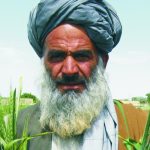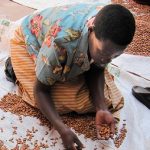The Working Group on Targeted Food Interventions, which was chaired by IFPRI, introduced the concept of the Food for Education program in August 1992, through which families were given food in exchange for their children’s continued attendance in school. This innovative idea was endorsed by the World Bank as a promising approach. In 1993, the Bangladeshi government introduced a pilot Food for Education program based on the recommendations from IFPRI and its partners. It used the savings accumulated from terminating the Palli Rationing Program for a more effectively targeted, food-based intervention.
Improving Public Food Distribution in Bangladesh
In response to natural disasters and crop failures that caused food shortages in the 1990s and 2000s, the World Food Programme (WFP) and other donors supplied food for the Government of Bangladesh to distribute. However, with growing concerns that food aid was not reaching the most vulnerable, WFP called on IFPRI in 2003 to examine the source of food aid "leakages."
Leveraging Agriculture for Nutrition in South Asia (LANSA)
Agriculture is the primary livelihood for nearly half the population of South Asia, and yet its potential to reduce undernutrition remains unrealized. One-third of children in South Asia are stunted. Despite increasing political will to improve nutrition, evidence has been sparse on how agriculture and agrifood systems can be better designed to improve nutrition. In 2012, a research consortium called Leveraging Agriculture for Nutrition in South Asia (LANSA) was formed among the Collective on Social Science Research in Pakistan, BRAC, the Leverhulme Centre for Integrated Research on Agriculture and Health (LCIRAH), the Institute of Development Studies (IDS), and IFPRI, under the leadership of the M.S. Swaminathan Research Foundation and with support from UK's Department for International Development (DFID). The aim was to generate evidence to strengthen the nutrition sensitivity of agrifood systems in Afghanistan, Bangladesh, India, and Pakistan.
HarvestPlus: Addressing Nutritional Challenges through Zinc Rice
In Bangladesh, 41 percent of children under five are estimated to be zinc deficient according to the Bangladesh Demography Survey, and the country loses over US$700 million in gross domestic product due to vitamin and mineral deficiencies according to the World Bank. Faced with such deficiencies in nutrition and productivity, HarvestPlus, in partnership with the European Commission and the IFPRI-led CGIAR Research Program on Agriculture for Nutrition and Health (A4NH), worked closely with the Bangladesh Rice Research Institute (BRRI), the International Rice Research Institute, and 30 other partners to develop three rice varieties fortified with zinc.
Reinvigorating Pakistan’s Rural Development
On January 25, 2017, IFPRI will launch a new book on Pakistan's agricultural transformation in Washington, D.C. IFPRI's cutting-edge evaluations and capacity building activities have helped shape a policy research agenda for the country to achieve economic growth and poverty reduction.
Tracking Hunger and Strengthening Resilience: An IFPRI-Germany Partnership towards Sustainable Development
IFPRI has been partnering with German development agencies, universities, and nongovernmental organizations (NGOs) for more than three decades to build the evidence base needed to effectively tackle pressing development issues.
- « Previous Page
- 1
- 2
- 3
- 4
- 5
- 6
- …
- 17
- Next Page »



